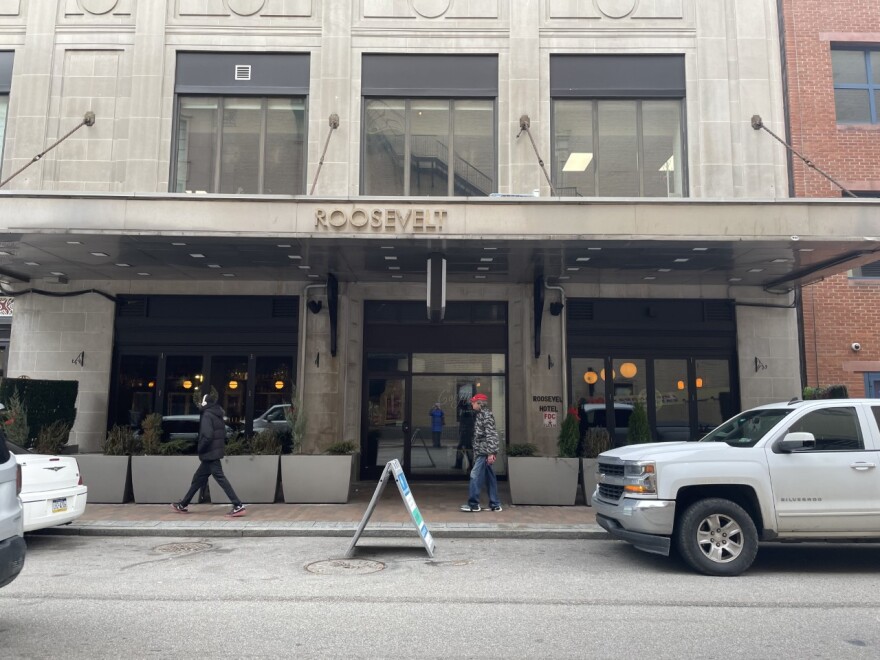Tenants who are seeking an emergency injunction that would prevent them from being forced from their homes in a fire-damaged apartment building have been given a temporary reprieve by a judge to allow time for them to find other housing — though it’s unclear for how long.
The Roosevelt Building downtown was the site of a deadly fire in December; tenants later were told they had until this Friday, Jan. 13, to move out to allow for buildingwide fire- and water-related repairs to begin next week.
Allegheny County Common Pleas Judge Patrick Connelly heard arguments in an emergency court proceeding Wednesday afternoon; that hearing will continue Thursday. Before concluding proceedings on Wednesday, however, the judge said no tenants will be removed from the building on Friday, nor will their belongings.
The case was filed Wednesday in Allegheny County Common Pleas Court against building owner LWE Roosevelt LP and property manager NDC Real Estate Management LLC. Nonprofit legal aid organizations Community Justice Project and Neighborhood Legal Services filed the suit on behalf of eight low-income tenants, most of whom are elderly.
The residents want to remain in their homes because they say they have nowhere else to go that they can afford. They’re asking for an injunction to allow them to stay in their homes, and to keep any major construction from starting in the building unless they’re provided with “adequate temporary replacement housing.”
Parts of the Penn Avenue building have been condemned, according to a notice from the city posted on the door, though not the entire property. The plaintiffs live in parts of the building that were not directly damaged by the fire, in which one person died and three others were injured.
But residents say they were told in a Dec. 23 letter that fire and water damage was so great that all residents would have to move out to allow for renovations.
“[T]here will be an extended period that the mechanicals of the building will have to be shut down. We do not know how long the work will take to complete,” according to the letter sent to tenants, which was included in court documents.
The letter states renovations are scheduled to begin on Jan. 16. It includes a list of roughly a dozen other affordable properties residents can call to seek alternative housing.
More than 100 of the 191 apartments in the Roosevelt Building are subsidized through a federal housing assistance program. As part of the program, the building owner has signed a contract with the U.S. Department of Housing and Urban Development, according to the plaintiffs' court filing.
Under this program, residents “may be terminated from the program and evicted only for tenant violations of program requirements,” attorneys for the residents argue.

Rex Coughenour is typical of many of the building’s residents, the plaintiffs’ legal brief argues. He is 68 years old and lives on retirement income and Supplemental Security Income. He stayed in a hotel paid for by the Roosevelt for a few weeks following the fire, but he returned to his apartment after the Roosevelt stopped paying for his hotel stays. The filing contends Coughenour had nowhere else to go.
He “has experienced severe stress and anxiety over the pending, threatened displacement from his home," his attorneys say in the brief. "He has applied for alternative subsidized housing with the City of Pittsburgh but has not been offered housing, only placement on lengthy waiting lists. If the Defendants lock him out of his apartment on January 13th, Mr. Coughenour will become homeless.”
The filing also asserts that the property owners "have offered no concrete replacement housing alternatives." Instead, they "have only provided residents with a list of HUD-subsidized buildings in the area, most or all of which have long waiting lists and none of which have immediate vacancies to absorb the residents of the Roosevelt Building … most of whom are very low-income, many of whom are elderly and/or disabled, and many of whom have no available housing alternatives.”
In a packed courtroom on Wednesday, with numerous tenants in attendance, the hearing at times grew contentious.
Jonathan Kamin, an attorney for the building owner and managers, said their experts have told them the water damage caused by the fire sprinklers must be fixed as soon as possible because of mold and other health risks.
“There are serious health issues associated with the units,” he said.
He also pointed to efforts by his clients to assist residents — first with temporary hotel stays, then with assistance such as filling out applications for other housing.
“We have been working around the clock since the fire to try to get people placed. We’ve spent hundreds of thousands of dollars,” Kamin said.
Residents and their attorneys disputed that the building’s management was helpful in finding new housing.
Gloria Robinette, 82, testified Wednesday that the manager at the Roosevelt harassed her about when she was moving out, sending frequent text messages and even going so far as to call her son, who is listed as her emergency contact, to ask him when she would be leaving.
Robinette said she had made many calls trying to find other affordable housing and was told other properties had lengthy waiting lists of one or two years.
“There are no availabilities in any of these buildings. None,” she said.
Kamin said more than 100 tenants have found other housing.
A witness for the plaintiffs, Shannon Evans, who works for the Allegheny County Department of Human Services and assists people in the wake of fires and other disasters, said she believed the actual number is closer to 24, out of the 186 units that were occupied at the time of the fire. Kamin challenged her figures as out-of-date.
The disagreement about numbers is one reason why Connelly decided to continue the hearing on Thursday.
Kamin said he also wants to present expert testimony about the safety of the building when the hearing resumes.













